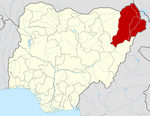Chibok
Chibok | |
|---|---|
LGA and town | |
 Chibok | |
| Coordinates: 10°52′11″N 12°50′48″E / 10.86972°N 12.84667°ECoordinates: 10°52′11″N 12°50′48″E / 10.86972°N 12.84667°E | |
| Country | |
| State | Borno State |
| Area | |
| • Total | 1,350 km2 (520 sq mi) |
| Elevation | 417 m (1,368 ft) |
| Population (2006) | |
| • Total | 66,105 |
| • Density | 49/km2 (130/sq mi) |
| Time zone | UTC+1 (WAT) |
| Postal code | 601 |
Chibok is a Local Government Area of Borno State, Nigeria, located in the south of the state. Its headquarters are in the town of Chibok. It has an area of 1,350 km² and a population of 66,105 at the 2006 census, who are Kibaku by tribe.[1][2] Most of the village speaks the Kibaku language.[1]
It is one of the sixteen LGAs that constitute the Borno Emirate, a traditional state in Borno State, northwest Nigeria.[3]
In January 2015, the BringBackOurGirls group aired concerns over plans by the Independent National Electoral Commission (INEC) to exclude Chibok and some communities currently under the control of jihadist group Boko Haram from receiving permanent voter cards (PVCs) for the 2015 general election.[4]
Boko Haram[]
In April 2014, nearly 300 girls, most of whom were Christian, were abducted from Chibok by Boko Haram.[5][6][7][8]
In May 2014, Boko Haram attacked Chibok again.
In November 2014, it was reported that Boko Haram had taken control of the town and implemented Sharia law. The military announced a few days later that they had recaptured the town.[9]
References[]
- ^ Jump up to: a b Adam Nossiter (May 14, 2014). "Tales of censusapees in Nigeria Add to Worries About Other Kidnapped Girls". New York Times. Retrieved May 15, 2014.
"Most of the Chibok residents are Christians of a small minority group who speak Kibaku, another of Nigeria's myriad languages."
- ^ New York Times: "Nigerian Girls Seen in Video From Militants" By ADAM NOSSITERMAY May 12, 2014 |"Chibok is primarily a Muslim and Christian village, and Mr. Shekau appeared to acknowledge that many of the girls seized were not Muslims. "The girls that have not accepted Islam, they are now gathered in numbers," he said. "And we treat them well the way the prophet treated the infidels he seized."
- ^ Nigeria (2000). Nigeria: a people united, a future assured. 2, State Surveys (Millennium ed.). Abuja, Nigeria: Federal Ministry of Information. p. 106. ISBN 9780104089.
- ^ Chika Mefor; Ejike Ejike (2015-01-08). "allAfrica.com: Nigeria: Elections - BBOG Group Raises the Alarm Over Plans to Exclude Chibok From Voting". Leadership (Abuja) - allAfrica.com. Retrieved 2015-01-08.
- ^ Adam Nossiter (May 14, 2014). "Tales of Escapees in Nigeria Add to Worries About Other Kidnapped Girls". New York Times. Retrieved May 15, 2014.
"Most of the Chibok residents are Christians of a small minority group who speak Kibaku, another of Nigeria's myriad languages."
- ^ The Guardian: "Military operation launched to locate kidnapped Nigerian girls" by David Smith May 14, 2014 | "Although most of the abducted girls are Christian, all were wearing Muslim dress and two were singled out to say they had converted to Islam."
- ^ BBC: "Nigeria abduction video: Schoolgirls 'recognised'" May 13, 2014 |"The girls' families have said that most of those seized are Christians, although there are a number of Muslims among them."
- ^ Oren Dorell (April 14, 2014). "Terrorists kidnap more than 200 Nigerian girls". USA Today. Retrieved April 23, 2014.
- ^ "Nigeria army says back in control of Chibok". Al Jazeera. 16 November 2014.
Further reading[]
- Neher, Gerald A. (2011). Life among the Chibok of Nigeria. McPherson, KS: Gerald Neher Publishing. ISBN 9780983157304.
- Local Government Areas in Borno State
- Populated places in Borno State

